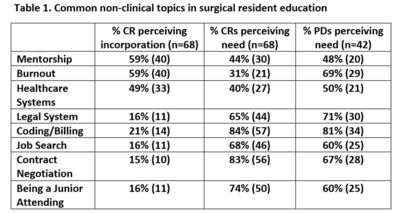Poster1 - 02: EDUCATOR AND TRAINEE PERSPECTIVES ON THE NEED FOR A DEDICATED, NON-CLINICAL, âREAL WORLDâ CURRICULUM IN GENERAL SURGERY TRAINING
Praveen Sridhar, MD1, Sabrina Sanchez, MD, MPH1, Peter J DiPasco, MD2, Lawrence M Novak, MD1, Tracey Dechert, MD1, Tejal S Brahmbhatt, MD1; 1Boston University, 2University of Kansas Medical Center
Introduction. Surgical residency programs are beginning to identify non-clinical, real world (RW) components of surgical practice and incorporate them into didactic teaching, recognizing that certain RW skills are not acquired during residency, leaving graduates unprepared to navigate these areas as young surgeons. It is unknown whether formal training in these skills is necessary or useful. We hypothesize that there is a need for a standardized RW curriculum, and that chief residents (CR) and program directors (PD) will prioritize RW topics for inclusion differently.
Methods. PDs and CRs from general surgery residency programs accredited by the Accreditation Council for Graduate Medical Education (ACGME) were solicited a 25-question anonymous survey graded using a Likert scale. Data was analyzed using descriptive statistics.
Results. There were 42 PD responses and 68 CR responses. Table 1 describes CR perceptions of their current non-clinical education and CR and PD perceptions of the need to incorporate these topics into formal resident education. CRs and PDs agree on the need for formal education on all topics except ‘Burnout’ (p<0.0001). Additionally, nearly 50% or more of CRs lack confidence to independently determine their own worth (economically and non-financially), conduct a job search, negotiate a contract, select disability insurance, and formulate retirement plans.

Conclusion. CRs lack the confidence to independently navigate many non-clinical topics that are important for success as physicians. PDs and CRs agree on the need to incorporate most non-clinical subjects surveyed into formal training except for ‘Burnout’, which is concerning given the prevalence of surgeon burnout. Validation of a uniform, integrated, RW curriculum to address these findings is still needed.
